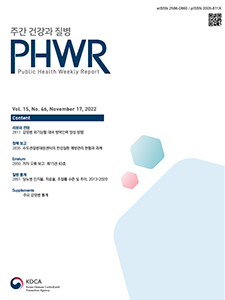Current Issue
Vol.15 No.46, November 17, 2022
-
Review & Perspective 2022-11-17
 1
1
 2396
2396
 633
633
The Direction of the Training of Personnel for Control and Prevention of Communicable Diseases in Preparation for the Crisis Caused by Communicable Diseases
Moo-Sik Lee*
Public Health Weekly Report 2022; 15(46): 2811-2834 https://doi.org/10.56786/PHWR.2022.15.46.2811 Abstract
AbstractThe epidemic of emerging and re-emerging infectious diseases and the threat of pandemic have increased rapidly. Due to the COVID-19 crisis and the Public Health Emergency of International Concern, it is crucial to train and secure health and medical personnel with field epidemiological expertise in preparing and responding to infectious diseases. The need to quickly respond to all ministries and stakeholder queries through cooperation between related ministries and agencies, strengthen capabilities for response professional personnel response, and train preliminary personnel has been very important, and due to the rapid emergence of diseases the need to reorganize the education and training process has also been raised. Based on the needs and experiences required to prepare and response to health threats by professional personnel of infectious diseases, we urgently reorganized the process and system of education to strengthen the professional competence of Epidemiological Investigation Officers. The executives course was expanded to ‘strengthen the control and prevention officer’s competence’, the ‘process of strengthening the competence of frontline workers ( Field Epidemiology Training Program – Frontline)’ was reorganized into the ‘process of fostering response personnel and strengthening competence for preparing and responding communicable diseases’. It is important to reorganize the education and training process through continuous improvement of training specialists in order to effectively respond to new types of infectious diseases and bioterrorism, as well as reorganize and review manpower planning in the framework of the national health and medical system in the future.
-
Policy Notes 2022-11-17
 1
1
 686
686
 203
203
The Current Status and Task of Non-communicable Disease Prevention and Management of the Capital Regional Center for Disease Control and Prevention
Sungnam Kim, Sun Jin Nho, Yu Ree Kim, Jinsook Kim*
Public Health Weekly Report 2022; 15(46): 2835-2849 https://doi.org/10.56786/PHWR.2022.15.46.2835AbstractAs the Korea Centers for Disease Control and Prevention was promoted to the Korea Disease Control and Prevention Agency (KDCA) in September 2020, five Regional Centers for Disease Control and Prevention were established nationwide as regional hub centers for local public health, based on cooperation with local governments. In this report, the performance of the Division of Chronic Disease Investigation in the Capital Regional Center for Disease Control and Prevention was reviewed. Action tasks for strengthening the prevention and management of non-communicable diseases (NCDs) centered on the local community, were identified for implementation in the future. NCDs are the biggest cause of death, and as the incidence increases owing to the rapid aging of the population, disease burden is also expected to increase. In addition, there is a high possibility that the health of the vulnerable population will deteriorate further as NCDs increase after the COVID-19 outbreak and the health gap between regions intensifies. Therefore, it is important to identify and expand regionally tailored programs to secure health equity and reduce the disparity between different income groups and regions for NCDs. It is necessary to establish an effective basis for the central government's NCD-related policies by strengthening the cooperative system between regional centers and local governments and promoting regionally tailored projects to improve health equity. The central government's NCD prevention and management policy direction and the local governments’ NCD-related projects are organically connected to maximize the effect; therefore, the Capital Regional Center will play an active role as a bridge between the KDCA and local governments.
-
QuickStats 2022-11-17
 0
0
 2585
2585
 479
479
Diabetes Awareness, Treatment, and Control, 2013–2020
Public Health Weekly Report 2022; 15(46): 2851-2852 https://doi.org/10.56786/PHWR.2022.15.46.2851

pp. 287~325
Most Keyword
?
What is Most Keyword?
- It is the most frequently used keyword in articles in this journal for the past two years.
Most Read
-
Management of Technology Development Efforts to Enhance the Healthcare Establishment’s Infection Response Capabilities
Misuk An, Hyeyoung Lee, Se-Jin Jeong, Hojin Lee, Sunkyung Baek
Public Health Weekly Report 2026;19: 1-12 https://doi.org/10.56786/PHWR.2026.19.1.1 -
Status and Future Tasks of the Regional Infectious Disease Specialized Hospital Establishment Project for Responding to Large-scale Emerging Infectious Disease Crises
Jeong-won Yeom, Hae-won Cho, Ju-hong Kim, Jong-hee Choi
Public Health Weekly Report 2026;19: 13-28 https://doi.org/10.56786/PHWR.2026.19.1.2
Editorial Office
+82-43-719-7569





 Full Text
Full Text Cite
Cite


